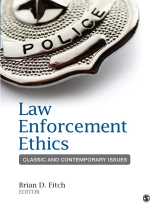This unique collection of essays covers many of the important facets of law enforcement ethics, including the selection, training, and supervision of officers. Editor Brian D. Fitch brings together the works of a diverse task force with a vested interested in reducing officer misconduct—including law enforcement scholars, educators, and practitioners from a variety of disciplines—to present a comprehensive look at this critical subject that is gaining more attention in agencies and in the media today. The text covers topics on the roles of culture, environment, social learning, policy, and reward systems as they pertain to law enforcement ethics, as well as the ethics of force, interrogations, marginality, and racial profiling. This volume also covers several unique aspects of ethics, such as the role of Post-Traumatic Stress Disorder in misconduct (PTSD), cheating during law enforcement promotional practices, off-duty misconduct, and best practices in developing countries.
Spis treści
Chapter 1 – Law Enforcement: An Introduction – J.J. Klaver
Chapter 2 – Psychological Evaluations of Law Enforcement Applicants: The Search for Ethical Officers – Ana M. Gamez and Gary G. Collins
Chapter 3 – Rhetoric Versus Reality: Why Ethics Training Fails – And What Can Be Done To Fix It – Brian D. Fitch, Christine H. Jones, Luann P. Pannell
Chapter 4 – The Role of Supervision in Motivating and Maintaining a Culture of Ethics – Brian D. Fitch, Randy B. Means, Gregory Seidel
Chapter 5 – Ethics and Accountability: Policy and Oversight in the United Kingdom – Attilio R. Grandani
Chapter 6 – Police Misconduct: Weakness of the Will – Theron L. Bowman and Daniel T. Primozic
Chapter 7 – Bad Apple or Bad Barrel: Social Learning Theory as a Paradigm for Understanding Law Enforcement Misconduct – Brian D. Fitch and Christine H. Jones
Chapter 8 – Ethics, Enforcement, and the Prospect of Professionalism – Aaron D. Conley and Bryon G. Gustafson
Chapter 9 – The Psychology of Marginality – Paul T. Zipper and Tina Adams
Chapter 10- Psychological and Neurophysiological Correlates, Determinants, and Predictors of Misconduct in Law Enforcement Officers With Subclinical Posttraumatic Stress Disorder – Amir Hamidi and Patrick M.Koga
Chapter 11 – Ethics in Police Use of Force: Duty, Principle, and Morality – Kevin A. Elliott and Joycelyn M. Pollock
Chapter 12 – Law Enforcement Interrogations: An Ethical Perspective – James L. Ruffin
Chapter 13 – Law Enforcement Promotional Practices: The Ultimate Test of Ethics – Alexandro Villamueva
Chapter 14 – Henry Louis Gates and Racial Profiling: What′s the Problem? – Bernard E. Harcourt
Chapter 15 – Leading Within the Era of Superagencies: Recruiting, Educating, Inspiring, and Retaining the Post 9/11 Generation of Officers – Kelly W. Sunberg
Chapter 16 -Implementing Democratic Policing Reform: Challenges and Constraints in Developing Countries – Cyndi Banks
Chapter 17 – The Tarnished Badge: The Effects of Off-duty Misconduct – David Massey
Chapter 18 – Public Information in the Age of Youtube: Citizen Journalism and the Expanding Scope of Police Accountability – Jarret Lovell
O autorze
Brian D. Fitch, Ph D, is an adjunct professor of criminal justice at California State University, Fullerton. Dr. Fitch served for 34 years with the Los Angeles County Sheriff’s Department before retiring as a lieutenant. He has worked assignments in field operations, narcotics, forgery and fraud, advanced officer training, professional development, custody, and correctional services. Dr. Fitch has trained more than 10, 000 law enforcement officers throughout the United States, as well as internationally in Canada, Oman, Qatar, Saudi Arabia, and the United Arab Emirates, in leadership, decision making, and communication skills. He has held positions at California State University–Long Beach, Southwestern University School of Law, Cerritos College, Riverside College, and East Los Angeles College. Dr. Fitch teaches in the leadership development programs sponsored by the Los Angeles Police Department, and Los Angeles Fire Department. Dr. Fitch has published two prior books with Sage, Law Enforcement Ethics: Classic and Contemporary Issues (2013) and Law Enforcement Interpersonal Communication and Conflict Management: The IMPACT Model. Dr. Fitch lives in Orange County, California, with his wife, Monica.












